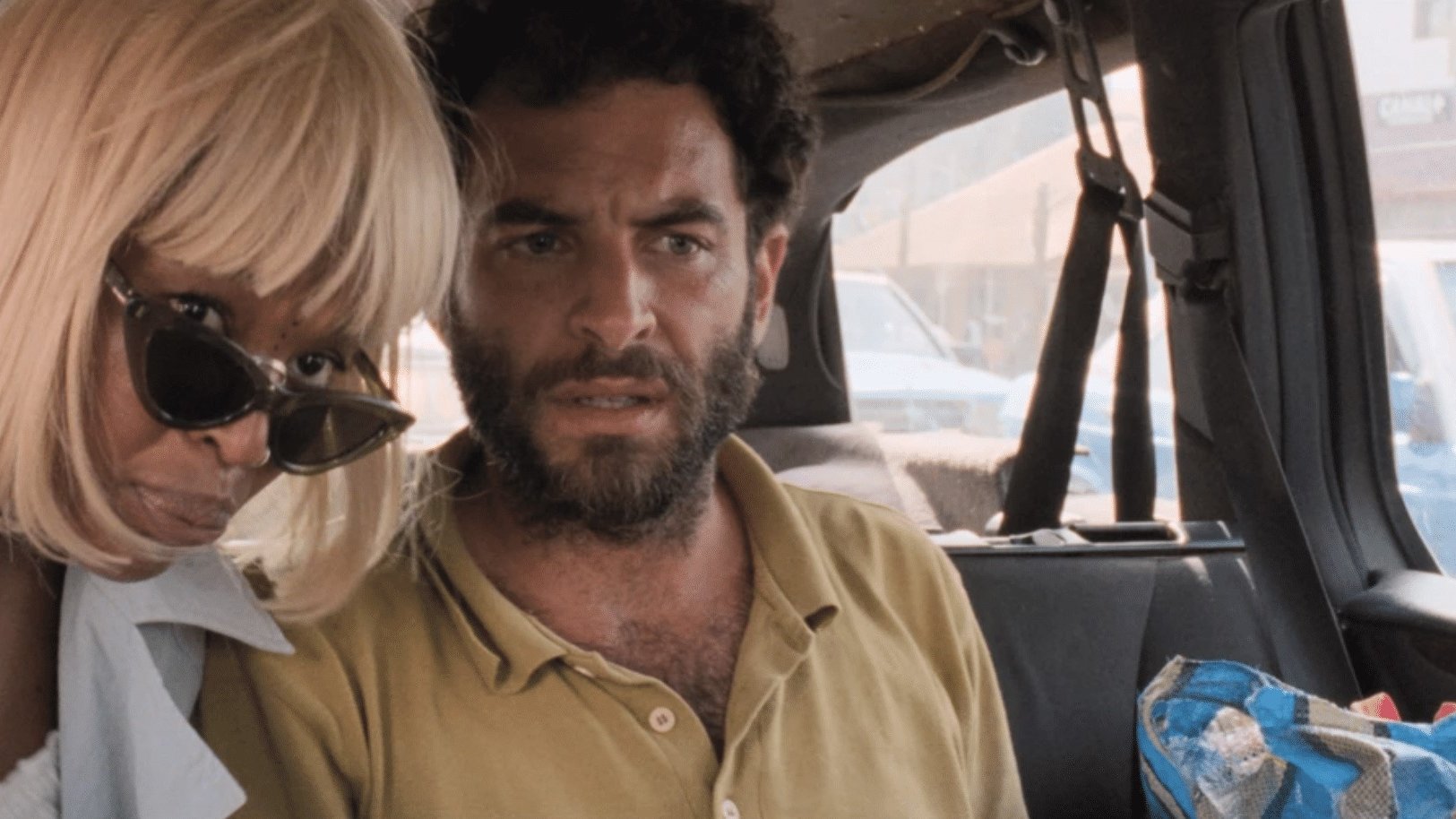
Sérgio, an environmental engineer in his forties, examines reports in Africa for an NGO regarding the relevance of various projects. A big man in his forties with a solid and reassuring appearance, he seems rather unremarkable, but his magnificent eyes are enough to pique curiosity. He is sent to Guinea-Bissau to investigate the construction of a road, the relevance of which is difficult to grasp, in wetlands where people travel by boat and live to the rhythm of the rice harvests.
In the opening of Pedro Pinho’s exceptional, 3.5-hour-long film, Sérgio (Sérgio Coragem) drives an old station wagon surrounded by clouds of sand on a desert road. The car eventually breaks down, and Sérgio walks deeper into the sandy haze, almost dancing. From that point on, the film takes on a magical quality : we wonder who this man is and what will happen to him. For now, he is expected in Bissau, where his predecessor had « problems » and has since disappeared.
Disappear from the frame
The hazy yet masterful opening of Rire et le Couteau immediately establishes the film’s central themes : human solitude and the grandeur and power of nature, which Sérgio must confront. We can say from the outset that the actor is fantastic, as is the character he portrays, who is just as hazy as the desert he crosses to reach Bissau. Sérgio often seems to disappear from the frame. Yet, he is present in every scene, participating in the many discussions that punctuate the film. However, he mostly remains silent, showing his surprise with a glance or a frown, and sometimes falls asleep anywhere, at any time. He doesn’t flee from conversations but offers few answers. He listens, but what does he truly understand ?
He quickly meets Diára (Cleo Diára), who asks him the basic yet fundamental question, « Why are you here ? », and his best friend, Gui (Jonathan Guilherme). Playful, fond of wigs and often sumptuous hairpieces, Diára (winner of the « Un Certain Regard » acting prize at Cannes 2025), is with Gui at the center of Bissau’s nightlife. Gui, for his part, has come from Brazil and dresses as a woman. Sérgio will try to tame them, to love both, and the film takes on a queer tone by exploding genres with crossed, surprising desires, bodies that seek each other, share, and give themselves.
Mocking friendships
Diára and Gui are exciting and deeply touching characters. Beyond their teasing friendship with Sérgio – who also exasperates them (« look at him trying to fit in as if everything’s fine ») – they are at the center of a galaxy of people : families, friends, new money, those nostalgic for the decolonial epic, and clear-sighted peasant women. Each one offers the right words, sometimes gentle and sometimes fierce, words that touch the heart.
In this country where the population speaks fifty languages, Sérgio switches from Creole to Portuguese, from French to English, and his words become as hesitant as his character, who, for his part, struggles to find the right word. The ambiguity of his mission prevents him from doing so, but he doesn’t have the cynicism of people who have seen it all, nor the uninhibited racism of these white workers, except for the women they buy, nor the ridiculous condescension of NGO missionaries who are just passing through.
The director Pedro Pinho, with an ultra-precise screenplay and exceptionally accurate dialogue, delivers a shattering dive into a subject without ever being preachy. He films « politics » at its best, which is to say, in service of the public good. Here, everything is laid bare – even the actors, in sex scenes rarely seen in a mainstream film, but which are grounded in human reality. We perfectly grasp the hidden stakes, the corruption, the absurd projects, and maybe even murder.
Everything is bare
Everything is laid bare because Pinho’s questions are as fundamental as they are eternal. Who is White ? Who is Black ? Who is colonial ? Who is postcolonial (and how is it different) ? Who is right ? Who is wrong ? Who is homosexual ? Who is heterosexual ? The uncertain character of Sérgio indicates that no answer is simple. But in these times of hammered certainties, where Hollywood is beginning to surrender to the racist Trumpian supremacism, Le Rire et le Couteau is a breath of fresh air.
The fact that this film has a Portuguese director and is shot in Africa, with French producers among others, obviously goes against this crude world. Because with its climate of uncertainties, its challenges to life and love, this film shows us that nothing is simple, but that nothing is lost either. It is not just the sum of a long series of questions, but also a form of answer, on a subject that is as central as it is universal today : to flee and hide or to stay and resist. The peasant women who do not want to abandon their ancestral boats for a neo-capitalist road with vague Chinese interests know a thing or two about this.
The unusual length shouldn’t be a concern. Besides, a full 5-hour and 15-minute version will be released in September. From my experience, it’s much less boring than watching a Bastille Day parade on television. And much less stupid, too.

Les articles présentés sur notre site sont soumis au droit d’auteur. Si vous souhaitez reproduire ou traduire un article d’Afrique XXI, merci de nous contacter préalablement pour obtenir l’autorisation de(s) auteur.e.s.
